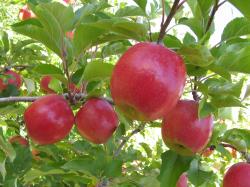Pink Lady America Conducts Focus Group
December 11, 2009 | 2 min to read

Convenient bags of apple slices are quickly becoming favorites at fast food restaurants and in schools, as consumers seek out healthy and satisfying snacks and desserts. Consumers are also recognizing that they prefer specific varieties of apples.
Recent research conducted in focus groups in Boston, Los Angeles, Chicago and Seattle, showed that consumers overwhelmingly preferred slices of Pink Lady apples and would seek out packages of slices that displayed the Pink Lady brand. As the market for this convenient apple product increases, the growers of Pink Lady apples are letting consumers, commercial apple slicers and foodservice operations know how just how strongly the consumer groups preferred their variety.
Consumers, discussing what they liked about apples, regularly mentioned Pink Lady’s crisp texture, tart-sweet flavor and attractive tall shape. All the consumers agreed that Pink Lady was the “Queen” of apples and that it was a special-occasion apple for enjoying out of hand as a snack or dessert. While only a small percentage of the respondents considered themselves cooks, those who did discussed that they preferred to use Pink Lady apples in salads, pies and for baking.
The Pink Lady apple was created in Australia as a natural cross between the popular Golden Delicious and the Lady William varieties by John Cripps, at the Western Australia Department of Agriculture. Pink Lady trees were first planted in the US in 1994 and the variety’s popularity has continued to grow.
Pink Lady apples are different from other apples because they carry a trademark to protect their name, provide standards of quality and aid in promotion efforts. They are also different in every way – the tree, the leaf, the bud and the fruit. The apple’s shape is elongated and elliptical – tall and stately. This shape and the fact that the apple does not have an open calyx (blossom end) mean that it stores and travels well. Pink Lady apples are the last of US apple varieties to be harvested, usually in November, long after other apples.
Pink Lady apples are available all year ’round – fall and winter from US growing areas, mostly in Washington State, and then in the spring and summer when apples from the Southern Hemisphere (South Africa, Australia and New Zealand) come to market here.
This is the first pink apple. Others are red, green, yellow or striped. The beautiful blush of the Pink Lady sets it apart and makes it easily recognizable in the supermarket.
Pink Ladies are remarkable for their flavor – a unique blend of acids, sugar and complex aromatics. The first bite is tart, due to malic acid (the element of all apple tartness), followed by a delightful almost effervescent sweetness.
A Pink Lady apple is thin-skinned, making it easier to eat and cook with. Just underneath the thin pink skin are a group of aromatic compounds that add to its unique flavor. Pink Lady Apples store well. Do keep them in the crisper section of the refrigerator, to preserve their exceptional texture.
Pink Lady Apples are crisp and crunchy. Compared to other varieties, the Pink Lady has incredibly tight microscopic cells, which hold the flavorful juice. This means Pink Ladies have the crisp crunch apple lovers prefer, as proven by the consumer tests, and that the apples do not give up their juice in cooking. The result is pie, crisp, cobbler or baked apples with distinct slices or chunks, full of flavor.
Source: Pink Lady America
